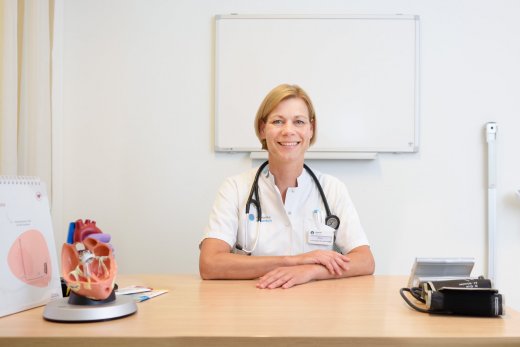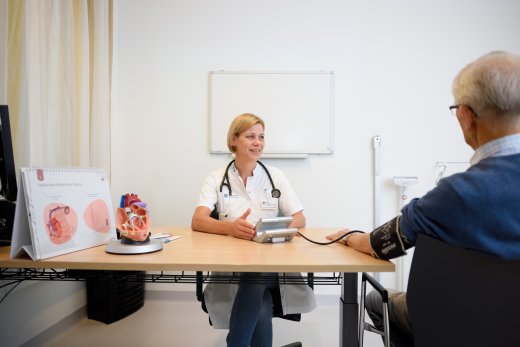04/07/2017
Keeping the quality of life as high as possible
My name is Cindy Verstappen and I have been a nurse in in the field of cardiology since 1999. In 2003 I became a nurse practitioner, which means that I integrate tasks typically performed by a cardiologist with those of a nurse. I map case histories, do physical examinations, treat, and guide patients at the heart failure clinic. I also educate cardiology nurses and nurse practitioners. I work closely with cardiologists, other nurse practitioners, general practitioners, the dietitian, the physiotherapist, personal carers in private homes, and heart patients and their families.
Contact with heart failure every day
I see heart failure patients on a daily basis. I ensure that everything goes smoothly for the patients and that they see all their other caretakers. We try to keep the patients' quality of life as high as possible, so they can stay at home, in their own environment, for as long as possible. Yet despite our best efforts, many patients with heart failure need to be rehospitalized multiple times. Either because their heart is too weak, or due to other factors that can provoke a deterioration of the condition of the patient.
Struggles every day
Living with heart failure comes with a lot of everyday struggles. Heart patients have to weigh themselves every day, meaning that they are confronted with their disease on a daily basis. Furthermore, heart patients need to keep a very strict diet, because they can only consume a limited amount of salt and water. The exact amount differs per patient, but following such strict guidelines takes a lot of discipline and determination, as does following the numerous edicts relating to the correct use and dosage of their medication. Finally, all these difficulties are compounded by frequent interruptions in the lives of these patients by visits to the hospital and the GP's office to monitor drug use, heart rate, blood pressure, and several molecular parameters.
There are also the societal issues to take into consideration. Heart patients usually get tired very easily and have other physical restrictions that make it hard for them to find a job. This sometimes gives rise to financial problems. Furthermore, because heart failure is invisible from the outside, people don't usually notice the condition of the patient. It is very visible if you break your arm and people will ask you how you are doing all the time, but when you have heart disease people don't notice the problem. This causes a lot of struggles in social interactions.
NT-proBNP
One of the molecular parameters we monitor is NT-proBNP, the target biomarker of SensUs 2017. (NT-pro)BNP maintains the blood pressure. We currently use this to test if there is an increase of heart failure in a patient. When someone suffers from heart failure, the pressure on the heart increases, and more (NT-pro)BNP is secreted into the blood. Therefore, a higher NT-proBNP value could be an indication for heart failure.
When we want to test for the amount of NT-proBNP, we draw blood and it takes at least a day before we have the results. If I request an urgent test in the morning, the laboratory is most of the time able to provide me the results at the end of the afternoon. However, it is currently impossible to have the result within an hour, which would be useful when I need them as supporting information to an examination.
Point-of-care testing
It would be a great help to have a device for point-of-care testing. Not only for use in the clinic, but also for patients to use at home. If patients had a biosensor for the monitoring of kidney function and NT-proBNP, that could really help to keep the patients out of the hospital. It would also be a great help if these devices were synched with the electronic record of the patient. That way I could monitor patients from a distance and only have to help them if their blood values or other parameters were off. Collecting all this information in their online electronic records would be a great help for the patients and for the healthcare professionals.
Furthermore, a biosensor could also give the patient more control over his or her own health. This is beneficial for the mental health state of the patient and will contribute greatly to their quality of life.
The SensUs competition
I believe the SensUs competition is a great initiative. Personally I have always been fascinated by innovations in health care and SensUs can contribute to that. I think the fact that the competition has so much contact with different stakeholders from hospitals and healthcare environments is amazing. This can provide a lot of useful information, since these people are going to be the ones that use the sensors once they become available. Having teams of students work on innovative solutions for point-of-care biosensing is really good. You can challenge each other and that stimulates even bigger and more innovative thinking.


Facebook
YouTube
LinkedIn
Instagram